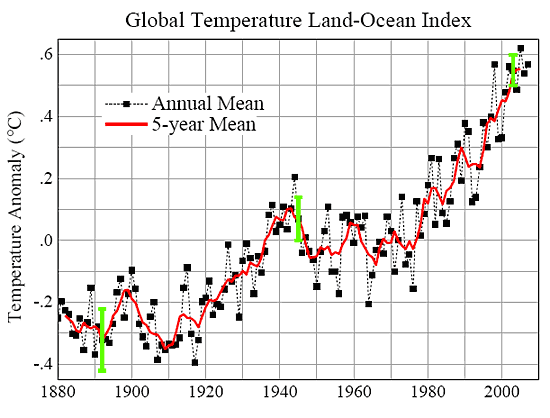How can global warming cause cold weather?
2 Answers
It is important not to confuse climate and weather when discussing cold weather.
Explanation:
Climate change refers to changes in weather patterns and climate over long periods of time, hundreds of years. Usually, when we're referring to climate, we're talking about at least thirty years. Weather is what we experience over a shorter period of time. To learn more, click here. Thus, cold weather does not necessarily say anything about climate. If you look at weather patterns over decades, then you should be able to say something about the climate.
For example, in the image below, we can see that there are some dips in average temperature. If we look at the larger picture, we see that there is clearly a general trend of warming.

Some believe that a loss of sea ice in the arctic has shifted the jet stream, causing a change in pockets of warm air and pockets of cool air. Low levels of sea ice during the northern winter mean that area that was once ice (and reflected the sun's rays) is now ocean (and absorbs the sun's rays). These changes affect the jet stream and caused a pocket of cold air to dip into the northern US in 2014. This is a contested theory though. To read more, see this article.
Most scientists agree that more research needs to be done on the polar vortex and changes in the jet stream, so stay tuned.
Your question contains the answer. Global warming is a "global" phenomenon, applying to the entire planet. A cold winter is a regional weather issue.
Explanation:
Clearly not all parts of the world have experienced a cold winter. For example, in parts of central Europe it has been extremely cold. In London, UK, it has been rather wet and mild.
"Global warming" as the name implies, relates to the average temperature over the entire surface of the planet - this, it can be clearly demonstrated, has been increasing steadily for a number of years, and still is increasing.
But despite the fact that the "global" average temperature has been increasing, that doesn't mean that in certain areas at certain times of the year you might measure an incidence of very cold weather.
As an analogy, if you made a visit to a quiet coastal town on the east coast of England, you may find a large number of elderly retired people living there, because its a nice quiet relaxing place. The average age of residents of that town might be well over 50.
But that doesn't mean that the entire UK population is made up of people over 50 years of age!


